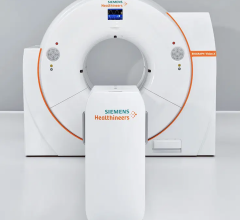
May 11, 2010 - An aggressive weekly preoperative regimen of positron emission tomography (PET) significantly improved distant metastasis-free and overall survival in patients with highly aggressive breast tumors.
Patients in the randomized Italian SICOG 9908 trial had locally advanced breast cancer. The disease break down as follows: 136 patients had T4a-c disease, 47 had inflammatory breast cancer and 17 had N2 breast cancer.
Patients underwent 12 weekly cycles of PET (cisplatin, epirubicin, paclitaxel), compared with four tri-weekly cycles of epirubicin and paclitaxel (ET), given preoperatively to women with locally advanced breast cancer.
The researchers found distant metastasis-free survival (DMFS) at five years was significantly better in the PET patients (73 vs. 55 percent; P = .037). PET also significantly improved elapse-free survival (RFS) rates in patients with grade 3 tumors.
The 12-week therapy improved both DMFS and overall survival (OS) in patients with locally advanced breast cancer, over the survival outcomes attained with four triweekly cycles of ET.
The study showed that patients receiving PET had a significantly lower risk of distant metastasis and death.
The authors stated: “These data confirm that patients with inflammatory disease should not have breast-conserving therapy. Further, stage three B patients should have an accurate initial work-up, including (Fludeoxyglucose) FDG-PET and dynamic magnetic resonance imaging, to rule out occult and distant metastases.”
They also noted, “irradiation of both internal mammary and supraclavicular nodal regions should be mandatory in patients with stage three B disease at diagnosis, regardless of their pathologic response to neoadjuvant chemotherapy.”
Reference: Frasci, G., D'Aiuto, G., et al. “Preoperative Weekly Cisplatin, Epirubicin, and Paclitaxel (PET) Improves Prognosis in Locally Advanced Breast Cancer Patients: An Update of the Southern Italy Cooperative Oncology Group (SICOG) Randomised Trial 9908.” Ann Oncol. 2010 Apr 1;21(4):707-716. Southern Italy Cooperative Oncology Group, Italy.
For more information: annonc.oxfordjournals.org/content/by/year


 July 25, 2024
July 25, 2024 








